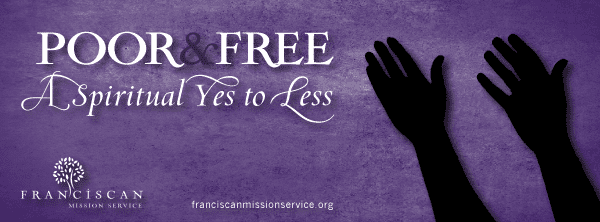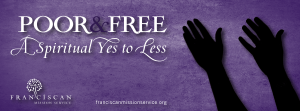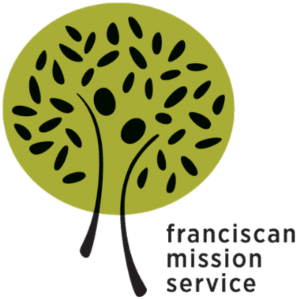Poor and Free: The Shane Claiborne Interview Part II

Franciscan Mission Service presents:
“Poor and Free: A Spiritual Yes to Less” every Friday in Lent
Series contributions:
- Shane Claiborne: Part I, Part II, and Part III
- Gigi Gruenke: “Invest in God’s Dream”
- Jack Jezreel: “The Simple Math of Voluntary Simplicity”
- Amy Echeverria: “Saying ‘Yes’ to Love”
- Sr. Marie Lucey (OSF): “Faith Keeps Hope Alive”
- Marie Dennis: “Beyond Detachment”
- Fr. Martin Day, OFM Conv.: “Letting Go of Lent”
For Lent 2014, Franciscan Mission Service presents “Poor and Free: A Spiritual Yes to Less”!
Beginning yesterday, Ash Wednesday, with an interview of social justice activist Shane Claiborne, our series contributors focus on the joyful freedom of spiritual poverty.
While Christians are called to value loving relationships over possessions, American culture can seem to promote money and materialism instead. However, the Good News is that detachment of ownership leads us to greater reliance on God which makes us more available to love and serve the poor.
Shane is one of the founders of The Simple Way faith community in Philadelphia whose members live a radical and vibrant Christianity that has inspired a generation of intentional communities. Shane is also identified with the New Monasticism movement as well as Red Letter Christianity. A prolific author and speaker, Franciscan Mission Service is honored to interview Shane about our shared values of loving, joyful faith lived through the freedom of answering God’s call with a “Spiritual Yes to Less”.
FMS: In Matthew 6:24, Jesus clearly states that one cannot serve both God and money. What does it really mean to serve money and why does Jesus so clearly state its incongruity with a faith life?
SC: If we are not free to share our stuff, then I don’t think we don’t own it, but it owns us. Our identity, our security begins to lie and rest in the stuff of earth, in our 401k plan, our house, our ability to pay the bills etc. It’s a very tenous place for our hope to rest. Moths can destroy it, thieves can steal it, fires can burn it.
We lost our house several years ago and what was amazing was two things. One of them was seeing how our whole neighborhood came together. It was a huge fire that destroyed a whole block and a hundred families were displaced. But when the Red Cross put up a shelter they ended up saying that no one stayed in the shelter because everyone opened their homes up to each other. It was a beautiful thing to see our neighborhood come together in open homes, sharing things with people who had lost their homes.
There was another moment with a neighbor whose house had burnt down and was terribly destroyed by the fire. I asked how he was feeling and he looked at the burnt out factory and said, “Well, God is still good. And I can see the moon now that the factory is burnt down.”
What a powerful thing for someone to say whose house had just burnt down! It is such a perfect joy that Francis speaks of, “When we can have very little and still find joy, then we are truly alive.” That’s where we want to get. A part of what is true in that is that God continues to provide. There is a message of it that is mystical.
When we put our possessions at the foot of one another, there is enough to take care of those in need. Jesus didn’t send the disciples out with nothing so they would suffer, but so they would be dependent on God.
They discovered as we have, that even though we might say, “We have no house,” we have homes everywhere we go.
FMS: In the past, you’ve endorsed Rick Warren’s idea that it isn’t a sin in itself to be rich, but it is a sin to die rich. What is your spiritual guidance to professionally successful women and men with any level of disposable income who want to be spiritually free from attachments?
SC: One of the things that is at the core of the early church’s message that I think is inspired by Jesus is that when we talk about sharing it’s not just about the stuff, but it’s about love, to love our neighbor as ourself. That love comes with responsibilities. When we have brothers and sisters dying because they don’t have a mosquito net that costs three dollars, it should cause us to think about our actions differently when we pay four dollars for a coffee.
What’s important is that it’s not about guilt. It’s about love. It’s pretty clear in Corinthians that if we sell everything we have and give it to the poor, but we don’t have love, it’s still empty. For the early Church, distribution wasn’t a prescription for community, it was a description of the community. It wasn’t just an anecdote, some form of socialism or communism, but a community that was radically changing the world by their love, loving brothers and sisters as themselves.
They consistently said, “We have no right to keep more than we need when someone else has less. If we have two coats, we’ve stolen one.”
Whereas St. Vincent DePaul said, “When I go to the poor and I feed them, I get on my knees and beg forgiveness because I’m only returning what has been stolen from them.”
It’s that posture that says charity isn’t some great virtue. It’s just what you should do because it’s what love stirs in us. In that sense, I would be very critical of charity when we make it to be a huge exceptional value like when someone writes a $10,000 check. For most of us, what we’re talking about is trying to redistribute what’s been stolen. And building a world where everyone does have this day our daily bread. To take more than our daily bread when someone else has less is a violation of the prayer of Jesus, “Ask this day our daily bread” and not “My daily bread” for everyone to have enough today.
One of the things we need with this idea of radical sharing that’s found in the Franciscan tradition is the joy of it and a lot of social-justice folks have lost the joy and the celebration that Jesus had. The idea of Jubilee and celebration. Jesus didn’t come to give us guilt to the fullest, but life to the fullest.
One of my favorite Mother Theresa quotes that St. Francis would love is when someone said to her, “Oh you’re such a saint, I wouldn’t do what you do for a million dollars.” And Mother Theresa said, “I wouldn’t do it if you paid me a million dollars either. I do it because it’s what I’m made for.” I think that’s true joy. That’s what I love about the Franciscan movement. It’s not about guilt. It’s about life. It’s about the fact that if we had a choice between a million dollars and our daily bread for everyone there’s no question we’d choose the latter.
Part III of our interview with Shane!
Tagged in:



